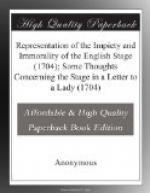(as corrupt as it is) can furnish us with many Instances
of those of your Sex, who think the Beauty
of the Mind does far surpass the gay Appearances of
the most splendid Outside: But yet, it must be
confessed, that there are others, (and those not a
few) whose Lives are almost one continued Circle of
Vanity and Folly. Such as divide the best and
most precious part of their Time between their Toilet,
the Exchange, and the Play-House.
This, I believe, upon Enquiry, will appear to be no
unjust Censure; tho’ at the same time, Madam,
I must freely own to you, that I think it a most amazing
thing, that the Ladies (at least those who
make any Pretensions to Virtue and Goodness) should
ever be seen at the last of these Places; where they
find themselves so scandalously treated. I am
apt to think, that very few of ’em have read
Mr. Collier’s ‘View of the Stage’;
if they had, they would there see the Corruptions
of the Plays set in so clear a Light, that one would
believe, they should never after be Tempted to appear
in a Place where Lewdness and Obscenity
(not to mention other Immoralities) are so great a
part of the Entertainment; a Place that is now become
the Common Rendezvouz of the most Lewd and
Dissolute Persons; the Exchange, (if I may so
call it) where they meet to carry on the vilest
and worst of Practices. ’Tis the
Nursery of all manner of Wickedness, where the
Seeds of Atheism and Irreligion are
sown, which Weak and Tender Minds too readily cultivate,
and from thence are easily led into a Contempt
of all that’s Serious. It is impossible
to say, how many, and how great the Mischiefs
are that spring from thence; which if a Man should
take a View of, it would perhaps, be one of the most
Melancholy Prospects that ever he beheld. To
look into our Modern Plays, and there to see
the Differences of Good and Evil confounded, Prophaneness,
Irreligion, and Unlawful Love, made the masterly Stroaks
of the fine Gentleman; Swearing, Cursing, and
Blaspheming, the Graces of his Conversation; and Unchristian
Revenge, to consummate the Character of the Hero;
Sharpness and Poignancy of Wit exerted with the greatest
Vigor against the Holy Order; in short, Religion
and all that is Sacred, Burlesqu’d and Ridicul’d;
To see this, I say, and withall, to reflect upon the
fatal Effects which these things have already had,
and how much worse are likely to follow, if not timely
prevented, cannot but fill the Minds of all good Men
with very dismal Apprehensions.
And are these then the Entertainments for a Christian to be pleas’d with; for one whose Salvation is to be wrought out with Fear and Trembling? Will the Strictnesses of Virtue and Religion be ever relished by a Mind tinctur’d with such Licentious Representations? Must not such Diversions (to say no worse of ’em) insensibly steal upon the Affections, especially of the Younger sort;




